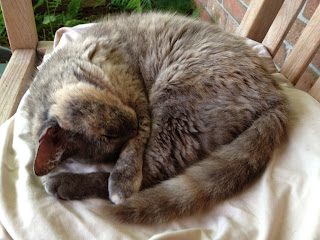 |
| That's me holding Jerry the dog. |
Tippy was the first in a succession of family dogs. Next came Sally and then Sox, who lived to the ripe old age of eleven. Sox was certainly not an original name (how many dogs and cats have been burdened with that too-cute moniker?), but I must have thought the spelling was clever. Sox was a Border Collie mix, but the only way she even remotely resembled a Border Collie was in her coloring. She had the energy of an old cat and was just as interested in fetching, or playing at all, really. However, she was the most loyal dog I've ever had, and she wanted nothing more than to be loved.
 |
| Sox in her golden years |
My adult experiences with dogs have been less fortunate. After a sweet but high-strung Dalmatian named Barney was killed (by a train, of all things), I adopted a mutt named Effie (after Sam Spade's secretary in The Maltese Falcon). My ex-wife let me choose the name because she knew I was resistant to getting the dog. I was right to be.
The first night we had Effie (she was just a few months old), she whined endlessly, and when I reached into her kennel to comfort her, she bit through my thumb. When I turned the light on, I could see that she was frothing at the mouth and convulsing. In the morning I made a trip to the doctor's office for a tetanus shot while Cindy rushed Effie to the vet's. The poor pup had suffered a seizure, brought on by distemper, and from that point on, she suffered the effects. She was often unruly, aggressive, disoriented A year later she was diagnosed with cancer, but after a series of complicated (and costly) procedures, she recovered.
 |
| Effie on a rainy day—the oppressive weather matched her personality. |
When Cindy and I divorced and I had to move to an apartment in another town, it was obvious that neither of us could keep Effie. But I found her a good home with a loving family, and the last time I saw Effie, she was happier than ever.
After my two previous experiences, I decided to steer clear of dogs, and it would be another ten years before a four-legged critter walked into my life. That, of course, was Chabo, whom I described in an earlier post.
 |
| The ever-circular Chabo doing what she did best |
When Chabo died, my wife Susan wanted to get another cat almost immediately, but for a variety of reasons, none of which I will chronicle here, we didn't find a suitable match for two months. Less than a week ago, however, Susan and I adopted a six-year-old tabby named Samantha, a "Second Chance Pet" who needed us as much as we needed her. Beyond the immediate circumstances that led to her being in a foster home, we know very little about Samantha, but given the hard life she has led in recent months, we didn't have the heart to rename her. She deserved to hang on to her own identity.
That being said, Susan and I have already given her several nicknames—Riley, Rita, and Zonkers, among others—but she will always be little Sam, who just might be the sweetest cat I have ever known. But we have barely gotten to know each other.
 |
| Sweet little Samantha |



